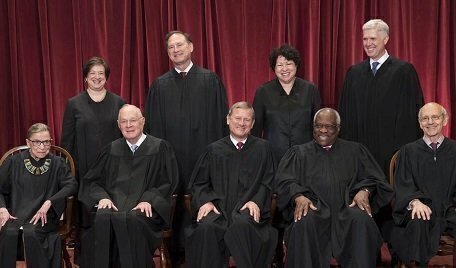The Supreme Court enters 2018 with several fresh cases, and a key postponed case, in front of the nine Justices next week, with a voter registration suit from Ohio expected to get the most attention.
 Arguments resume in the New Year on Monday, January 8, with a pair of original jurisdiction cases involving water rights between states. The following day, a pair of cases involves the ability of law enforcement to search rental cars and to look for a motorcycle under a tarp.
Arguments resume in the New Year on Monday, January 8, with a pair of original jurisdiction cases involving water rights between states. The following day, a pair of cases involves the ability of law enforcement to search rental cars and to look for a motorcycle under a tarp.
In Byrd v. United States, the dispute is over the following question: “Does a driver have a reasonable expectation of privacy in a rental car when he has the renter’s permission to drive the car but is not listed as an authorized driver on the rental agreement?”
Terrence Byrd was pulled over by Pennsylvania State Police for an apparent traffic violation while he was driving a car rented by his girlfriend. Byrd was not a signatory to the rental agreement nor covered by its provisions. Police then searched the car without a warrant and found heroin and a bulletproof vest. The lower courts ruled Byrd didn’t have an expectation of privacy. Byrd’s attorneys claim federal courts around the country are divided on the question.
The second case next Tuesday is Collins v. Virginia, which is about the Fourth Amendment’s “automobile exception.” Based on a 1999 Supreme Court decision, the exception states if “a car is readily mobile and probable cause exists to believe it contains contraband, the Fourth Amendment . . . permits police to search the vehicle” without a warrant.
In the Collins case, police saw a Facebook picture of what they believed was a stolen motorcycle, and then entered private property near a house, called its curtilage, to examine a motorcycle under a tarp, without a warrant. Collins claims Virginia’s courts expanded the automobile exception beyond precedents set the United States Supreme Court.
Then on Wednesday, January 10, the Justices will hear a case postponed from last fall due to an illness of one of the arguing attorneys. Husted v. A. Philip Randolph Institute considers a conflict between federal voting statutes and state-based programs to maintain voter registration lists by removing inactive voters. Ohio removes people from its list of registered voters if they don't respond to a notification after four years or vote again in that period.
In February 2017, Ohio Secretary of State Jon Husted filed a petition with the Supreme Court after the state lost a decision in the federal Sixth Circuit Appeals Court. Ohio believes that under the National Voter Registration Act of 1993 (or NVRA) and the Help America Vote Act of 2002 (or HAVA), it can start a “supplemental” process of voter purging for a person who “has not voted or appeared to vote in 2 or more consecutive general elections for Federal office.”
The Philip Randolph Institute challenged the state’s policy in 2016, claiming the voter-purging efforts eliminated a disproportionate number of lower-income and minority voters from the election process. It also contested Ohio’s interpretation of the federal laws that permitted voter inactivity as the “trigger” mechanism for maintaining voter rolls.
In federal district court, the state of Ohio won the first legal challenge. But the Philip Randolph Institute prevailed at the divided Sixth Circuit Appeals Court. Ohio asked the Supreme Court to take the case for several reasons, including the Sixth Circuit decision’s impact on other states that use similar voter-purge policies and the Court accepted the case in May 2017. So far, the Trump administration and 17 states have filed friend of the court briefs supporting Ohio, while the NAACP, Common Cause and former attorney general Eric Holder field briefs supporting the Randolph Institute.







